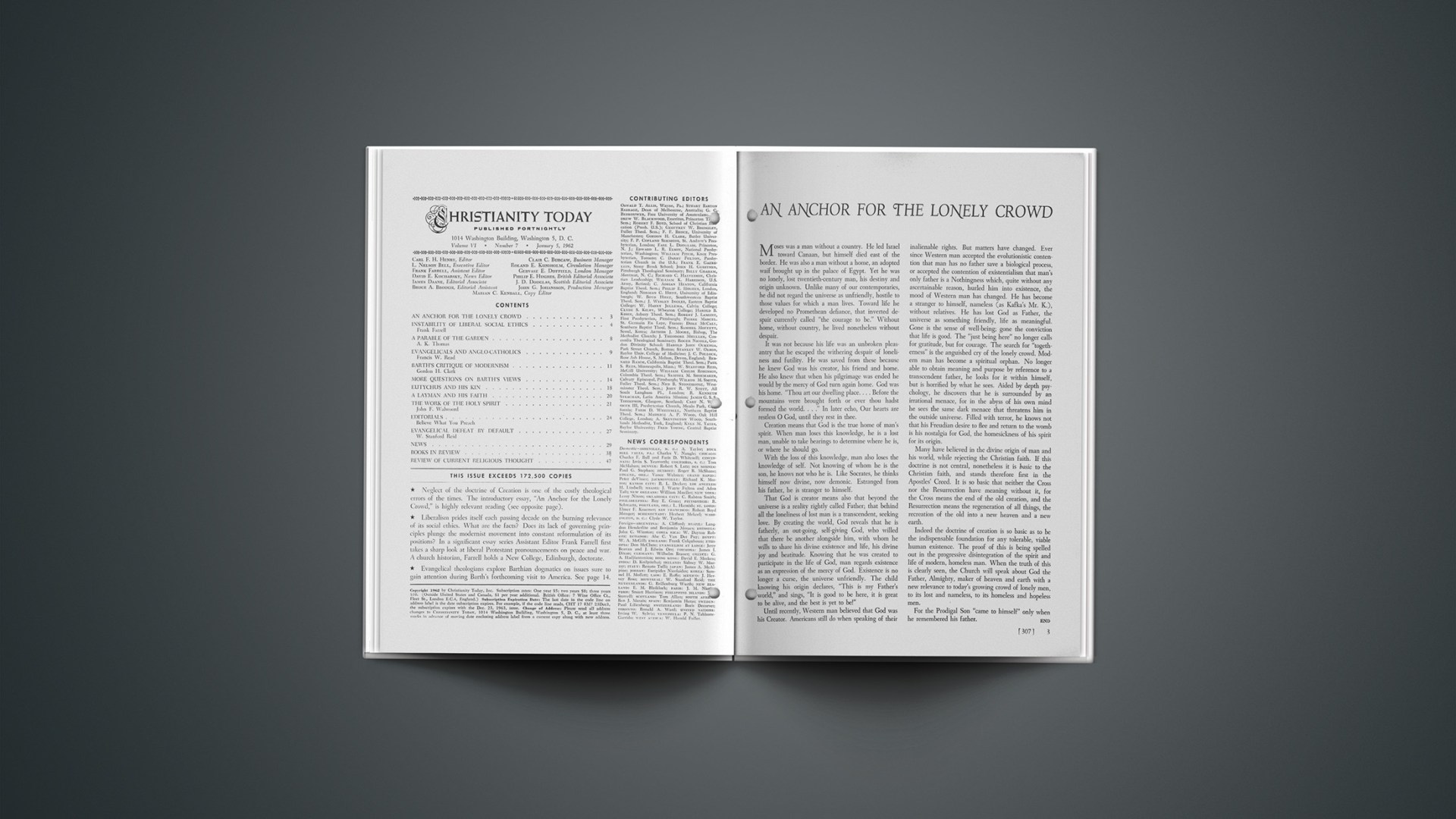Moses was a man without a country. He led Israel toward Canaan, but himself died east of the border. He was also a man without a home, an adopted waif brought up in the palace of Egypt. Yet he was no lonely, lost twentieth-century man, his destiny and origin unknown. Unlike many of our contemporaries, he did not regard the universe as unfriendly, hostile to those values for which a man lives. Toward life he developed no Promethean defiance, that inverted despair currently called “the courage to be.” Without home, without country, he lived nonetheless without despair.
It was not because his life was an unbroken pleasantry that he escaped the withering despair of loneliness and futility. He was saved from these because he knew God was his creator, his friend and home. He also knew that when his pilgrimage was ended he would by the mercy of God turn again home. God was his home. “Thou art our dwelling place.… Before the mountains were brought forth or ever thou hadst formed the world.…” In later echo, Our hearts are restless O God, until they rest in thee.
Creation means that God is the true home of man’s spirit. When man loses this knowledge, he is a lost man, unable to take bearings to determine where he is, or where he should go.
With the loss of this knowledge, man also loses the knowledge of self. Not knowing of whom he is the son, he knows not who he is. Like Socrates, he thinks himself now divine, now demonic. Estranged from his father, he is stranger to himself.
That God is creator means also that beyond the universe is a reality rightly called Father; that behind all the loneliness of lost man is a transcendent, seeking love. By creating the world, God reveals that he is fatherly, an out-going, self-giving God, who willed that there be another alongside him, with whom he wills to share his divine existence and life, his divine joy and beatitude. Knowing that he was created to participate in the life of God, man regards existence as an expression of the mercy of God. Existence is no longer a curse, the universe unfriendly. The child knowing his origin declares, “This is my Father’s world,” and sings, “It is good to be here, it is great to be alive, and the best is yet to be!”
Until recently, Western man believed that God was his Creator. Americans still do when speaking of their inalienable rights. But matters have changed. Ever since Western man accepted the evolutionistic contention that man has no father save a biological process, or accepted the contention of existentialism that man’s only father is a Nothingness which, quite without any ascertainable reason, hurled him into existence, the mood of Western man has changed. He has become a stranger to himself, nameless (as Kafka’s Mr. K.), without relatives. He has lost God as Father, the universe as something friendly, life as meaningful. Gone is the sense of well-being; gone the conviction that life is good. The “just being here” no longer calls for gratitude, but for courage. The search for “togetherness” is the anguished cry of the lonely crowd. Modern man has become a spiritual orphan. No longer able to obtain meaning and purpose by reference to a transcendent father, he looks for it within himself, but is horrified by what he sees. Aided by depth psychology, he discovers that he is surrounded by an irrational menace, for in the abyss of his own mind he sees the same dark menace that threatens him in the outside universe. Filled with terror, he knows not that his Freudian desire to flee and return to the womb is his nostalgia for God, the homesickness of his spirit for its origin.
Many have believed in the divine origin of man and his world, while rejecting the Christian faith. If this doctrine is not central, nonetheless it is basic to the Christian faith, and stands therefore first in the Apostles’ Creed. It is so basic that neither the Cross nor the Resurrection have meaning without it, for the Cross means the end of the old creation, and the Resurrection means the regeneration of all things, the recreation of the old into a new heaven and a new earth.
Indeed the doctrine of creation is so basic as to be the indispensable foundation for any tolerable, viable human existence. The proof of this is being spelled out in the progressive disintegration of the spirit and life of modern, homeless man. When the truth of this is clearly seen, the Church will speak about God the Father, Almighty, maker of heaven and earth with a new relevance to today’s growing crowd of lonely men, to its lost and nameless, to its homeless and hopeless men.
For the Prodigal Son “came to himself” only when he remembered his father.










